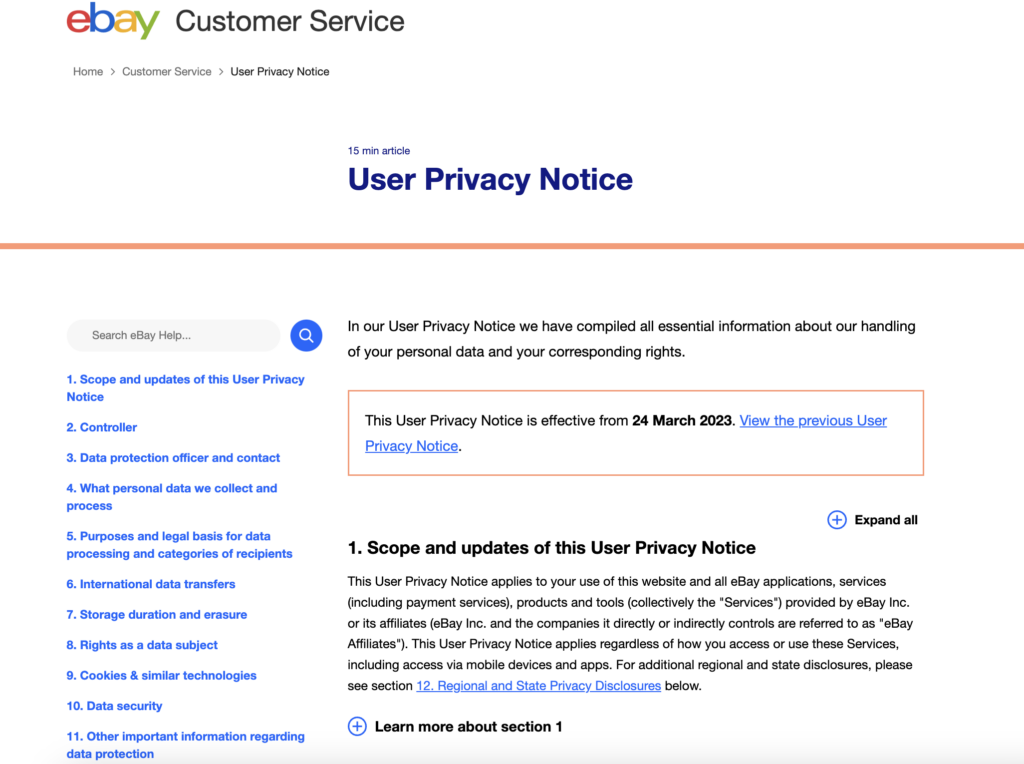Do you sell products or services online? Do you collect users’ personal data like payment information during checkout? Then your online store must include an up-to-date, conspicuous and easily accessible privacy policy document. Luckily, we’ve got what you need. Keep reading for everything you should know on the topic & a free ecommerce privacy policy template!
Generate a free Privacy Policy for your website that is customizable, professional, and drafted by an international legal team. A simple way to handle compliance.
See it in action (0:37)
In this article, we answer some common questions about privacy policies for ecommerce stores. Are they legally required? What’s the best way to generate one? What should it include? We also provide some examples of ecommerce privacy policies. Let’s get started!
Jump to ⬇️

Some examples of privacy policies include:
Yes, an online store typically needs a privacy policy because it very likely collects personal data. Let’s break this down.
A privacy policy is a document in which the data owner (the person or entity that runs the website) outlines the methods and purposes of its data processing to users, i.e. individuals who visit or use the online store.
Under most privacy laws like the GDPR, if the online store collects personal data, the owner must inform users of this fact by way of a privacy policy: it’s required by law and by third-party services it may use.
As you can imagine, it is very probable that your online store collects personal data, during check-out for example. Users are asked to insert things like their home or email address for delivery, as well as their payment information. Furthermore, the need for a privacy policy can be triggered by the presence of a simple contact form, Google Analytics, a cookie or even a social widget on the online store.
The legality of having an online store without a privacy policy largely depends on the jurisdiction in which the store operates and of its customers. Typically, a privacy policy for online store will be legally required when handling the personal data of users in regions with data protection laws like Europe or the United States.
🇪🇺🇬🇧 General Data Protection Regulation (GDPR): Applies to businesses that handle user data in Europe. It requires the inclusion of a privacy policy that discloses the methods of collecting, processing, and storing personal data, along with users’ rights.
🇺🇸 California Privacy Laws (CPRA), Virginia Privacy Laws (VCDPA) and other US State Laws: They apply to businesses that collect data from residents of these States. It requires the inclusion of a privacy policy that mentions personal information collected, how it’s used, with whom it’s shared, if it’s sold, among other things.
💡 Not sure which data privacy laws apply to you? Find out now with our 1-min free quiz!
You can create a privacy policy for your ecommerce website by writing it yourself, using an online ecommerce privacy policy template, a Privacy Policy Generator or plugin, or consulting a legal expert. While you should always pick the option that best fits your business, make sure it is a valid way to write such a legal document. Let’s take a look at each of them.
📌 Do-It-Yourself Approach: At first sight, this approach can be appealing due to its immediate and cost-effective nature. However, we strongly advise against it because of the risk of non-compliance due to potential gaps in legal knowledge. Without specialized legal expertise, drafting a complex and comprehensive legal document, ensuring it complies with all applicable laws, can be challenging and time-consuming. There are other relevant methods that won’t require you to divert valuable resources from other aspects of your business.
📌 Ecommerce Privacy Policy Template: you can find plenty online, and for free. Take a look at our own template here. Overall, it’s a great starting point and basic framework that you can customize according to your business’s specific needs. Be careful though as a sample ecommerce privacy policy is ususally designed to be a one-size-fits-all, which means it will not fully cover the unique aspects of your operations or the specific regulations you need to adhere to. It also might not be updated to reflect the latest legal requirements.
📌 [⭐ Recommended] Ecommerce Privacy Policy Generator: Among the options, a Privacy Policy Generator like iubenda stands out for its balance of quality, customization, ease of use, and compliance capabilities. These tools are specifically designed by legal experts to generate high-quality documents that meet the requirements of major data protection laws. They offer a more personalized approach than templates, allowing you to choose all the clauses related to your business operations and data handling practices. These tools do work on a paid subscription-basis but are much more affordable than hiring a legal expert and are generally updated over time following changes to your online store or the law. 💡 Also know these tools are available through easy-to-use plugins for online store platforms like Shopify.
📌 Legal Consultation: This option can be relevant for businesses that require the highest level of customization and professionalism. Of course, the costs associated are very high, even for one single consultation. The policy created is not a dynamic document like with automated solutions, this means you’ll likely need extra legal advice any time your data practices or global protection laws change.
In order to be compliant, your policy must at the very least mention:
eBay’s privacy documents are all available from their website’s footer, at all times (including when browsing products). It is quite concise for clarity, but users can expand sections for more detail if they wish to. This is a great way to have both a simplified and comprehensive version of the document, to meet GDPR’s requirements for information to be concise, transparent and intelligible.
You can access the policy page at this link.

See this GDPR compliant privacy policy created with the iubenda Privacy and Cookie Policy Generator for an example of how the elements listed above come together. Click on the button to open the document:
Privacy Policy👋 This sample ecommerce privacy policy template can only work for very basic legal documents. It can be used as a starting point and to understand how your own document could be structured. It must be customized to your unique business activities. 👉 We highly recommend using an Ecommerce Privacy Policy Generator for generating your own professional document. You can try ours for free!
Effective Date: [Insert Date]
We are committed to protecting the privacy and security of our customers and site visitors. This Privacy Policy outlines how we collect, use, share, and safeguard your personal information when you visit our website, [insert your website URL], and use our services.
[Insert here the contact detail of whoever is responsible for the collection and processing of user personal data at your company.]
We collect personal information that you provide to us when you use our services or interact with us. This includes:
We collect your data to:
We may share your information with third parties in the following circumstances:
We and our service providers store personal data in accordance with applicable data protection laws to the extent necessary for the processing purposes outlined in this privacy policy document.
We will delete personal data [in accordance with our data retention and deletion policy] or take steps to properly render the data anonymous, unless we are legally obliged or permitted to keep it longer.
We ensure the security of your personal information by employing both technical and organizational measures. These measures are put in place to reduce the risks related to data loss, misuse, unauthorized access and disclosure, or alteration.
Our website uses cookies and similar tracking technologies to improve your browsing experience, understand how you use our site, and show you personalized advertising. You can manage your cookie preferences through your browser settings. You can access our full cookie policy, [here].
You have the right to access, correct, delete, or restrict the use of your personal information. You can also object to the processing of your data in certain circumstances, including for marketing purposes. To exercise these rights, please contact us using the details below.
If you have any questions about this Privacy Policy or our privacy practices, please contact us at:
Data Controller: [Your Company Name]
Address: [Your Full Address]
Email: [Email Address]
We reserve the right to make changes to this Privacy Policy at any time. Any changes will be posted on this page with an updated effective date.
Not mentioned in our ecommerce privacy policy template above as it depends on your business activities, please remember to disclose any data transfers abroad. You can learn more here.
When adding a privacy policy to your online store, make sure it’s easy to find wherever you collect customer data to comply with legal requirements.
A website’s footer is a commonly used place to put your privacy policy link, as visitors can easily spot it and can go back to it at any time. You can also include the link in pop-ups or banners that show up when people first interact with your website for better visibility.
When people sign up for newsletters or updates, put the privacy policy link in a prominent spot since they’re providing personal information like their names and email addresses.
The checkout process is another important place to have a policy link, but it shouldn’t be the only location because not everyone will make a purchase.
💡 Consider adding the link to informational menus or sections to make it more visible, and you can also link other legal documents like Terms and Conditions.
Creating a privacy policy for your online store can be a serious headache.
iubenda compliance solutions are built with the strictest regulations in mind like the GDPR and the CCPA, and are:
With our Privacy and Cookie Policy Generator you can create a high-quality privacy policy for your online store:
🚀 Add any of over 1800 pre-defined clauses, or simply write your own;
🚀 Generate a dynamic document, install it on your site in a flash and update it whenever you need to;
🚀 Easily comply with the strictest privacy requirements globally!